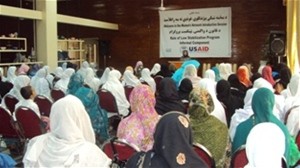
The women’s elders’ network meeting included presentations and discussions in Behsud and Surkh Rod districts.
USAID/RLS-I
A new 120-strong women's network strengthens the role of women elders resolving their village disputes.
11 OCTOBER 2010 | NANGARHAR PROVINCE, AFGHANISTAN
To see more than 120 women gathering for a meeting is uncommon in Afghanistan. Even more uncommon is 120 women attending a meeting to discuss resolving their village disputes.
In September, the USAID funded Rule of Law Stabilization – Informal Component project (RLS-I) invited wives of jirgamaran (elders) and influential Behsud and Surkh Rod district leaders to participate in their first forum to strengthen community-based dispute resolution. The meeting is one RLS-I activity that aims to build stability and citizens’ capacity to strengthen the rule of law in Afghanistan. Men sit on most jirgas in Nangarhar Province. However, elder’s wives often facilitate bringing disputes involving women before jirgas.
One meeting participant told of a recent dispute about water where a villager requested that she appeal to elders to hear the dispute. “I gathered jirgamaran,” the woman said. “Finally, after a long discussion, we made a fair and peaceful decision about the use of water, which was accepted by both parties.”
Another woman discussed a family disagreement about land, in which wives of elders themselves facilitated a solution. A woman, poor with several children, asked her father for land to farm. The father said that she would inherit land after he died. The daughter, however, feared that her uncles would steal her inheritance after her father’s death. After women elders discussed the issue with the father, he agreed that his daughter’s inheritance might be at risk and gave her a piece of land, and even a cow, for her family.
“This is the first time in my life I have participated in a meeting. It gives me a sense of being human, and feeling that women have value,” said a Kuchi woman who said that after her brother returned from the men’s meeting, he agreed she could attend a meeting for women elders.







Comment
Make a general inquiry or suggest an improvement.